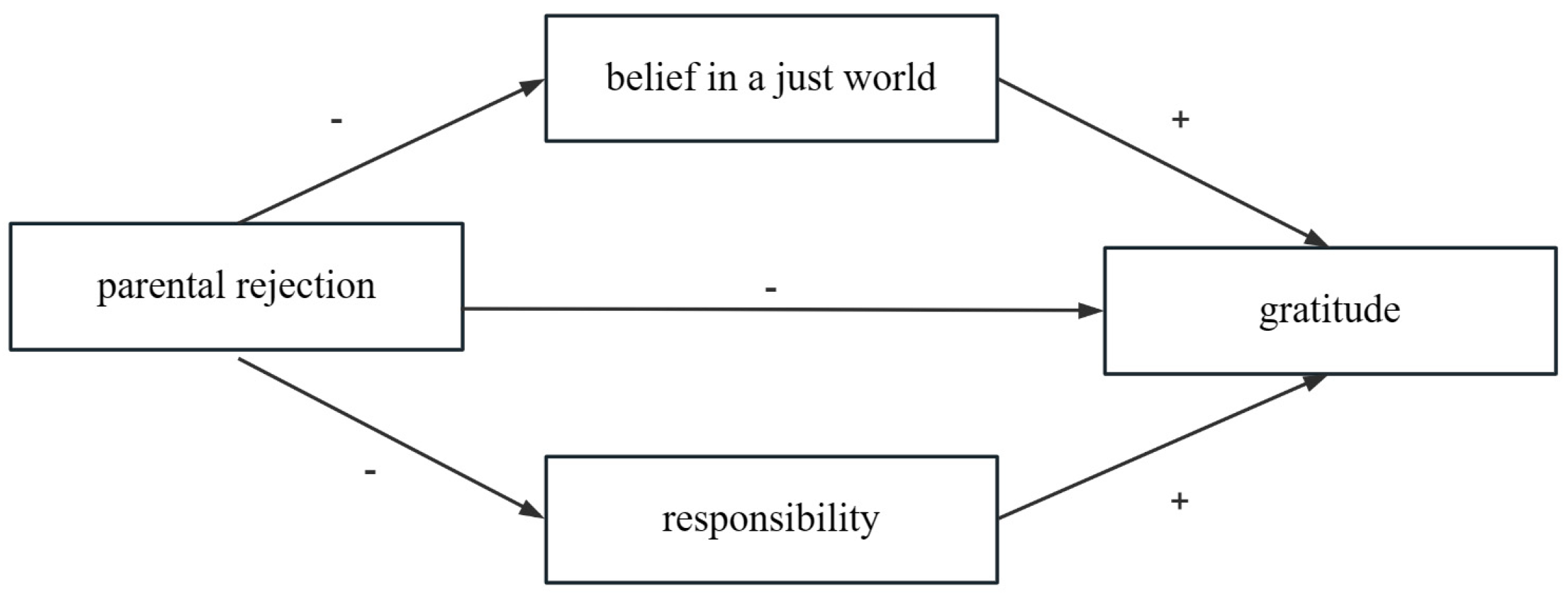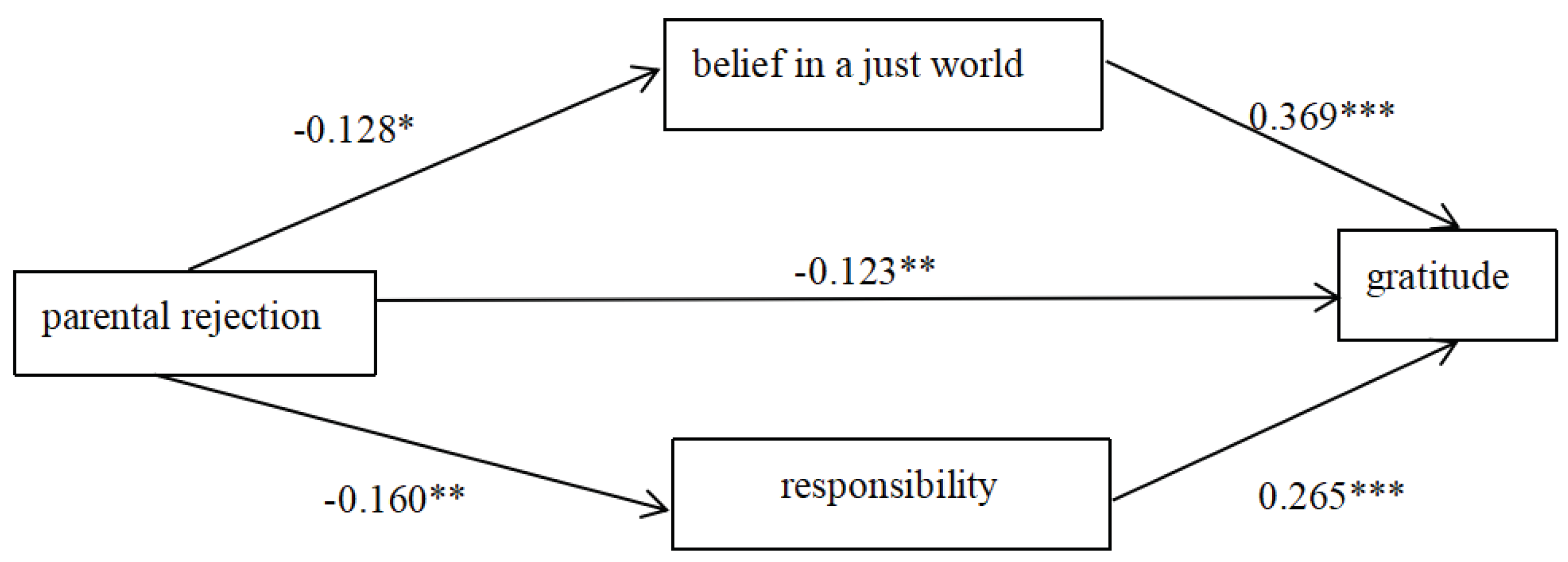Examining the Role of Responsibility and Belief in a Just World in the Relationship between Parental Rejection and Adolescents’ Gratitude
Abstract
1. Introduction
2. Materials and Methods
2.1. Participants
2.2. Measurements
2.2.1. Parental Rejection (Parents Rejection Scale)
2.2.2. Gratitude Questionnaire (The Gratitude Questionnaire-6, GQ-6)
2.2.3. Responsibility Questionnaire (Responsibility Questionnaire)
2.2.4. Belief in a Just World Scale
2.3. Data Analysis
2.4. Common Method Bias Test
3. Results
3.1. Descriptive and Correlational Analysis
3.2. Testing for the Proposed Mediation Model
4. Discussion
4.1. Relationship between Parental Rejection and Adolescents’ Gratitude
4.2. The Mediating Role of Responsibility and Belief in a Just World
5. Limitations, Future Directions, and Strength
6. Conclusions
Author Contributions
Funding
Institutional Review Board Statement
Informed Consent Statement
Data Availability Statement
Conflicts of Interest
Research Ethics
References
- Mccullough, M.E.; Emmons, R.A.; Tsang, J. The grateful disposition: A conceptual and empirical topography. J. Personal. Soc. Psychol. 2002, 82, 112–127. [Google Scholar] [CrossRef] [PubMed]
- He, A.; Liu, H.; Hui, Q. Preparation of youth gratitude scale based on trait gratitude: Preliminarily verify the three-dimensional structure theory of gratitude with self-aged scale. J. East China Norm. Univ. (Educ. Sci. Ed.) 2012, 30, 62–69. [Google Scholar]
- Liu, A.; Chen, Z.; Wang, S.; Guo, J.; Lin, L. Relationships between college students’ belief in a just world and their learning satisfaction: The chain mediating effects of gratitude and engagement. Psychol. Res. Behav. Manag. 2023, 16, 197–209. [Google Scholar] [CrossRef]
- Ma, X.; Zou, H.; Liu, Y.; Wu, Q.; Cui, L. General and personal just-world beliefs, gratitude, forgiveness, and cooperativeness: A multiple mediation model. Personal. Individ. Differ. 2023, 203, 112016. [Google Scholar] [CrossRef]
- Zhu, D.; Wang, G.; Zhou, Z.; Yang, K. The characteristics of left-behind children’s taste style and their relationship with gratitude---the intermediary role of self-esteem. Chin. J. Clin. Psychol. 2017, 25, 546–549. [Google Scholar] [CrossRef]
- Timmons, L.; Ekas, N.V.; Johnson, P. Thankful thinking: A thematic analysis of gratitude letters by mothers of children with autism spectrum disorder. Res. Autism Spectr. Disord. 2017, 34, 19–27. [Google Scholar] [CrossRef]
- Zhao, G.; Kong, F.; Liu, Z.; Feng, Y.; Huang, S.; Wang, Y.; Zhou, Z. The influence of parents’ emotional warmth on adolescent gratitude: The intermediary role of responsibility and fair world belief. Psychol. Dev. Educ. 2018, 34, 257–263. [Google Scholar] [CrossRef]
- Bono, G.; Froh, J. Gratitude in School: Benefits to Students and Schools; Routledge: New York, NY, USA, 2009; pp. 77–88. [Google Scholar]
- Huston, A.C.; Bentley, A.C. Human Development in Societal Context. Annu. Rev. Psychol. 2009, 61, 411–437. [Google Scholar] [CrossRef]
- Li, Y.; He, W.; Zhang, X.; Guo, Q.; Ma, B. The correlation between psychological capital and happiness index of parenting style. Chin. Sch. Health 2014, 35, 128–131. [Google Scholar]
- Zhang, C.; Huang, X.; Xue, J.; Hao, X.; Chen, L.; Zhang, L.; Jin, M.; Xing, Y. Relationship between depressive mood and parenting style of junior high school students and educational countermeasures. Int. J. Educ. Humanit. 2023, 6, 61–65. [Google Scholar] [CrossRef]
- Rohner, R.P.; Britner, P.A. Worldwide Mental Health Correlates of Parental Acceptance-Rejection: Review of Cross-Cultural and Intracultural Evidence. Cross-Cult. Res. 2002, 36, 16–47. [Google Scholar] [CrossRef]
- Khaleque, A. Perceived Parental Warmth, and Children’s Psychological Adjustment, and Personality Dispositions: A Meta-analysis. J. Child Fam. Stud. 2013, 22, 297–306. [Google Scholar] [CrossRef]
- Gui, Z.; Ren, X.; Li, X.; Zhou, C.; Sun, L. Parents’ parenting styles differences are associated with lifetime suicidal ideation: Evidence from chinese medical college students. J. Health Psychol. 2021, 27, 2420–2434. [Google Scholar] [CrossRef] [PubMed]
- Lee, S.; Mun, I.B. How does perceived parental rejection influence cyberbullying by children? A serial mediation model of children’s depression and smartphone addiction. Soc. Sci. J. 2022, 5, 1–16. [Google Scholar] [CrossRef]
- Xu, J.; Meng, Y. Medical students Thanksgiving and parenting style, personality relationship. Chin. J. Health Psychol. 2014, 22, 924–927. [Google Scholar] [CrossRef]
- Tan, X.; Qin, Q. Psychological research and outlook of responsibility. Chin. Psychol. Sci. 2005, 28, 991–994. [Google Scholar]
- Wei, X. The moral development status of college students and the educational response. J. Shandong Youth Political Sci. Coll. 2019, 35, 27–32. [Google Scholar] [CrossRef]
- Liu, C.; Yang, L. The influence of parenting style on the development of responsibility in children aged from 3 to 6 years old. Res. Presch. Educ. 2007, 145, 56–59. [Google Scholar]
- Wang, H.; Du, J. The effect of parent-child relationship on adolescent gratitude: The mediating role of responsibility. Psychol. Res. 2019, 12, 356–362. [Google Scholar]
- Lerner, M.J. Evaluation of performance as a function of performer’s reward and attractiveness. J. Personal. Soc. Psychol. 1965, 1, 355–360. [Google Scholar] [CrossRef]
- Zhou, C.; Guo, Y. The influence of family social class on college student mental health: The mediating role of belief in a just world. Chin. J. Clin. Psychol. 2013, 21, 118–122. [Google Scholar] [CrossRef]
- Lerner, M.J.; Miller, D.T. Just world research and the attribution process: Looking back and ahead. Psychol. Bull. 1978, 85, 1030–1051. [Google Scholar] [CrossRef]
- Hafer, C.L. Investment in Long-Term Goals and Commitment to Just Means Drive the Need to Believe in a Just World. Personal. Soc. Psychol. B 2000, 26, 1059–1073. [Google Scholar] [CrossRef]
- Dalbert, C. The World is More Just for Me than Generally: About the Personal Belief in a Just World Scale’s Validity. Soc. Justice Res. 1999, 12, 79–98. [Google Scholar] [CrossRef]
- Lipkusa, I.M.; Dalbert, C.; Siegler, I.C. The Importance of Distinguishing the Belief in a Just World for Self Versus for Others: Implications for Psychological Well-Being. Personal. Soc. Psychol. B 1996, 22, 666–677. [Google Scholar] [CrossRef]
- Umemura, T.; Šerek, J. Different Developmental Pathways from Parental Warmth to Adolescents’ Trust in Peers and Politicians: Mediating Roles of Adolescent–Parent Attachment and Belief in a Just World. Soc. Justice Res. 2016, 29, 186–205. [Google Scholar] [CrossRef]
- Liu, G.; Zhang, D.; Zhu, Z.; Li, J.; Chen, X. Impact of family socioeconomic status on adolescent problem behavior: A chain mediator of parents’ emotional warmth and fair world beliefs. Psychol. Dev. Educ. 2020, 36, 240–248. [Google Scholar] [CrossRef]
- Dalbert, C.; Radant, M. Parenting and young adolescents’ belief in a just world. In The Justice Motive in Adolescence and Young Adulthood: Origins and Consequences; Sallay, H., Dalbert, C., Eds.; Routledge: London, UK; New York, NY, USA, 2004; pp. 589–596. [Google Scholar]
- Bègue, L.; Charmoillaux, M.; Cochet, J.; Cury, C.; de Suremain, F. Altruistic Behavior and the Bidimensional Just World Belief. Am. J. Psychol. 2008, 121, 47–56. [Google Scholar] [CrossRef]
- Tian, Y.; Hong, Y.; Niu, G.; Fan, C. The impact of online social support on secondary vocational students: Fair world faith and gratitude. Psychol. Behav. Res. 2017, 15, 175–180. [Google Scholar]
- Ye, N.; Zhang, L. The influence of fair world belief on the emotional experience of left-behind junior high school students in rural areas: An analysis of multiple mediation effects. Spec. Educ. China 2017, 199, 80–84. [Google Scholar]
- Faccenda, L.; Pantaléon, N. Analysis of the relationships between sensitivity to injustice, principles of justice and belief in a just world. J. Moral Educ. 2011, 40, 491–511. [Google Scholar] [CrossRef]
- Jiang, J.; Lu, Z.; Jiang, B.; Xu, Y. Preliminary revision of the Chinese version of the short-form parenting style questionnaire. Psychol. Dev. Educ. 2010, 26, 94–99. [Google Scholar] [CrossRef]
- Yu, C.; Zhang, W.; Zeng, Y.; Ye, T.; Li, Y.; Wang, S. The relationship between gratitude and problem behavior in adolescents: The mediating role of school connection. Psychol. Dev. Educ. 2011, 27, 425–433. [Google Scholar] [CrossRef]
- Kay, A.C.; Jost, J.T. Complementary justice: Effects of “poor but happy” and “poor but honest” stereotype exemplars on system justification and implicit activation of the justice motive. J. Personal. Soc. Psychol. 2003, 85, 823–837. [Google Scholar] [CrossRef] [PubMed]
- Zhou, H.; Long, L. Statistical Test and Control Method of Common Method Bias. Adv. Psychol. Sci. 2004, 12, 942–950. [Google Scholar]
- Zhao, H.; Ke, Y.; Zhang, H.; Xu, Y.; Cheng, Q. The influence of family function on adolescent moral evasion: The role of responsibility and moral identity. Chin. Psychol. Sci. 2016, 39, 907–913. [Google Scholar] [CrossRef]
- Steinberg, L. Cognitive and affective development in adolescence. Trends Cogn. Sci. 2005, 9, 69–74. [Google Scholar] [CrossRef]


| M (SD) | 1 | 2 | 3 | 4 | |
|---|---|---|---|---|---|
| 1 gratitude | 5.13 (1.02) | 1 | |||
| 2 responsibility | 3.97 (0.61) | 0.402 ** | 1 | ||
| 3 belief in a just world | 4.58 (0.76) | 0.476 ** | 0.325 ** | 1 | |
| 4 parental rejection | 1.44 (0.49) | −0.218 ** | −0.167 ** | −0.14 ** | 1 |
| Model | Fit index in Total | Significance of Regression Coefficient | |||
|---|---|---|---|---|---|
| Outcome Variables | Predictive Variable | R2 | F | β | t |
| responsibility | gender | 0.031 | 3.740 * | 0.005 | 0.099 |
| age | 0.058 | 1.079 | |||
| parental rejection | −0.160 | −2.996 ** | |||
| belief in a just world Scale | gender | 0.027 | 3.208 * | 0.087 | 1.614 |
| age | 0.026 | 0.488 | |||
| parental rejection | −0.128 | −2.391 * | |||
| gratitude | gender | 0.315 | 31.862 *** | 0.050 | 1.100 |
| age | −0.048 | −1.059 | |||
| belief in a just world | 0.369 | 7.786 *** | |||
| responsibility | 0.265 | 5.571 *** | |||
| parental rejection | −0.123 | −2.680 ** | |||
| Value of Indirect Effect | Boot SE | 95%Boot LCI | 95% Boot UCI | Relative Mediation Effect | |
|---|---|---|---|---|---|
| total indirect effect | −0.094 | 0.033 | −0.161 | −0.033 | 73.06% |
| belief in a just world | −0.050 | 0.021 | −0.095 | −0.011 | 38.51% |
| responsibility | −0.045 | 0.021 | −0.089 | −0.008 | 34.55% |
| belief in a just world–responsibility | −0.005 | 0.027 | −0.061 | 0.047 | 3.96% |
Disclaimer/Publisher’s Note: The statements, opinions and data contained in all publications are solely those of the individual author(s) and contributor(s) and not of MDPI and/or the editor(s). MDPI and/or the editor(s) disclaim responsibility for any injury to people or property resulting from any ideas, methods, instructions or products referred to in the content. |
© 2023 by the authors. Licensee MDPI, Basel, Switzerland. This article is an open access article distributed under the terms and conditions of the Creative Commons Attribution (CC BY) license (https://creativecommons.org/licenses/by/4.0/).
Share and Cite
Xing, J.; Xu, X.; Wang, X. Examining the Role of Responsibility and Belief in a Just World in the Relationship between Parental Rejection and Adolescents’ Gratitude. Behav. Sci. 2023, 13, 305. https://doi.org/10.3390/bs13040305
Xing J, Xu X, Wang X. Examining the Role of Responsibility and Belief in a Just World in the Relationship between Parental Rejection and Adolescents’ Gratitude. Behavioral Sciences. 2023; 13(4):305. https://doi.org/10.3390/bs13040305
Chicago/Turabian StyleXing, Jingwen, Xiaofeng Xu, and Xingchao Wang. 2023. "Examining the Role of Responsibility and Belief in a Just World in the Relationship between Parental Rejection and Adolescents’ Gratitude" Behavioral Sciences 13, no. 4: 305. https://doi.org/10.3390/bs13040305
APA StyleXing, J., Xu, X., & Wang, X. (2023). Examining the Role of Responsibility and Belief in a Just World in the Relationship between Parental Rejection and Adolescents’ Gratitude. Behavioral Sciences, 13(4), 305. https://doi.org/10.3390/bs13040305





